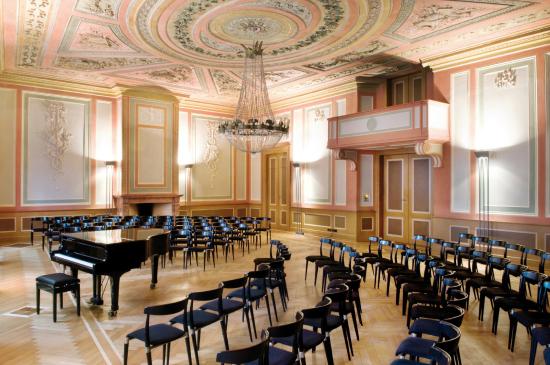Afraid of the CLA?
While many professional orchestras have already concluded a collective labor agreement, the Winterthur Conservatory is the only music school with a CLA.
The CLA has triggered a cultural change, says Benjamin Kellerhals, President of the Winterthur Conservatory Teachers' Association. Because they have a say in all important matters and are involved in decisions, the teachers show greater solidarity with their music school and are more likely to identify with the decisions made.
Obviously, both employees and employers are very satisfied with this model, and so the question arises as to why more music schools are not seriously addressing this issue. Is it because all music teachers in Switzerland are very satisfied with their professional situation and don't want to change anything, is it because they are afraid of jeopardizing their own employment if they tell the school management that they want to enter into CLA negotiations, or is it simply because they have too much respect for the huge amount of work involved in drawing up such a contract?
In 2002, the teaching staff at the Zurich Conservatory were already covered by a collective labor agreement. The NZZ wrote at the time that this CLA "can be regarded as trend-setting for the entire Swiss music school landscape." Due to the merger of the Zurich Conservatory with the Zurich Youth Music School (under public law) to form the MKZ, the CLA was dissolved; only music schools organized under private law can have a CLA.
A CLA has been in place at the Winterthur Conservatory since January 1, 2006, and it is still working well today.
I speak with Hans-Ulrich Munzinger, the former director of the Winterthur Conservatory, during whose tenure the CLA was negotiated.
Mr. Munzinger, what was the impetus for negotiating a CLA at the Winterthur Conservatory?
Some teachers have told me that they would like such negotiations, and it is quite clear that the music school management must respond to this. There were already initial experiences from Zurich, and the five-year process was supported by the MuV, VPOD and SMPV. Sibylle Schuppli from the MuV was the initiator of the Zurich CLA alongside Martha Gmünder from the SMPV, and she was able to bring this experience to the Winterthur negotiations.
Has all the hard work paid off? What are the benefits of the CLA for teaching staff and music school management today?
It was definitely worth it! The negotiation process itself was very important. Teaching staff and school management had to understand each other's situation exactly: the school management got to hear all the concerns and problems of the teaching staff, and the latter in turn found out which requirements from the authorities and politicians were decisive for the work of the school management.
We then had to convince each other of all the points of contention until a consensus was finally reached. Thanks to the negotiations and the resulting CLA, we achieved a very high level of transparency, which led to greater satisfaction on both sides.
For example, we have introduced a salary scale according to age. This means that it is clear to everyone who earns how much and when, and there is no more guesswork about why someone might be graded how. - Of course, you don't have to solve the wage issue in this way in a CLA; the important thing is simply to have clear guidelines and absolute transparency.
Does the school management still have room for maneuver with a CLA?
Of course, there is still a certain amount of room for maneuver, as we also want to shape and design something. We have deliberately kept the CLA lean and also regulate details in an "application booklet", in which individual points can be changed more easily with the agreement of the employer and employee side if they do not prove themselves in practice.
In addition, the school management can still do a lot in terms of selecting additional courses, special events and the school's public image.
Incidentally, the teaching staff also have a great deal of creative freedom when it comes to the style and content of lessons, and their own artistic activities are explicitly encouraged and promoted, for example by granting them time off.
Which points in the CEA or the application booklet do you find particularly important in practice?
There are a few: e.g. that any points of criticism in staff appraisals are announced in advance so that the teacher can prepare for the meeting. That long-term teachers can receive a workload guarantee for three semesters based on the average number of hours worked in the last four semesters. And centrally: that teachers clearly know what is expected of them in terms of their workload, namely preparation and follow-up work for lessons, student concerts, participation in the convention, further training and, last but not least, practicing on their own instrument. This leads to a pay factor of 1.75 for teaching hours to working hours.
What happens in the event of a dispute?
There is a joint committee (PaKo) that decides. If it does not come to a conclusion, the case goes to the official arbitration board, whose decision is binding. Fortunately, we have never had to go to them. This also shows how well the CLA works.
Thank you very much for the interview!
Dear readers, what do you think about the CLA? The SMPV looks forward to receiving letters to marianne.waelchli@smpv.ch!
As a professional association, one of its aims is to support members who wish to negotiate a CLA at their music school.
 Winterthur Conservatory Photo by Oliver Pailer
Winterthur Conservatory Photo by Oliver Pailer








